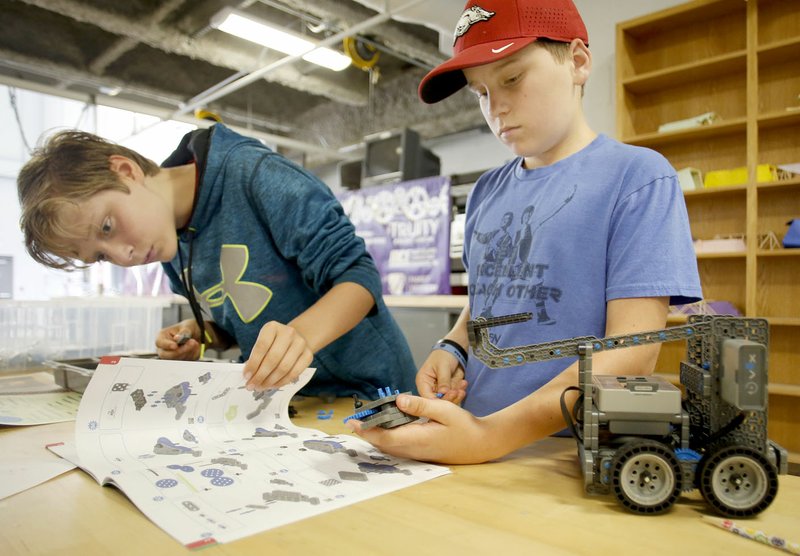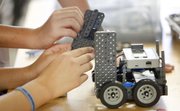FAYETTEVILLE -- The tower of cups inched up as 12-year-olds Charlie Schach and Savan Cashman took turns carefully placing another cup on top with makeshift tools.
They weren't allowed to touch the cups with their hands. The tower of purple cups reached 35½ inches tall, but they didn't stop there. It climbed to 44½ inches tall and then 47½ inches tall. Bethany Strasser, a teacher from Ramay Junior High School, declared them the winning team when they succeeded in placing the 14th cup on the top.
Fayetteville School District summer camps
• Bulldog Baseball Camp, June 6-8. $70. Second through eighth grade.
• Bulldog Basketball Camp, June 6-9. $70. First through eighth grade.
• Bulldog Football Camp, June 20-23. $80. Third through eighth grade.
• Fayetteville High School Volleyball Skills Camp. July 11-13. $50. Third through eighth grade.
• McNair University. June 13-17. $150. Fifth and sixth grades.
For more information, visit fayar.net.
Source: Fayetteville School District
But Jeff Seiter, who teaches at Woodland Junior High School, blew it down before they could measure it. Savan measured a cup to figure out the tower exceeded 50 inches.
The boys are among 37 students entering the sixth through 12th grades who are involved in a four-day Fayetteville Robotics Summer Camp at Fayetteville High School. The camp began Tuesday with 22 students in a morning session and 15 in an afternoon session.
A $10,000 grant from the Verizon Foundation provided money for Marianne Hauser, Fayetteville School District's director of career education, to pay $500 stipends to robotics, computer science and engineering teachers from Ramay and Woodland junior high schools and Fayetteville High School to lead the camp. The grant also paid for 16 Vex IQ robotics kits for the campers to build and program in groups.
The four-day session cost $150 for students, though a limited number of needs-based scholarships were available, according to information from the school district.
Strasser began the Wednesday afternoon session of the camp with the cup tower design challenge to help students begin thinking about solving problems, working as a team and communicating.
Then it was time to work on building Vex IQ robots using a kit, an instruction manual and a tray of small plastic parts. Each robot has a controller and the students will use a computer program to make the robot move.
Baydon Fuller, 13, and Kele Estes-Beard, 12, had a significant portion of the body of a robot built, but worked Wednesday to build and attach a claw. Baydon explained they will program the claw to pick up balls.
They quickly ran into a problem when they could find just one of two axles they needed for the claw. Kristian Cartwright, a Woodland teacher, sat down to help. Cartwright laid long skinny black parts side by side to see if he could find the missing part.
The missing black stick was found among some other black pieces in the wrong compartment of a gray tray of parts, Kele said. They were able to put the claw together and continued working to attach it to the body of the robot.
"I just love robotics," Baydon said. "Technology has always been one of my strong suits."
Fifth-graders in Fayetteville middle schools take a class where they build Vex IQ robots as part of an emphasis on courses that blend science, technology, engineering in math, Hauser said. Eighth-graders have the option to take an automation and robotics course. High school students work with robots during engineering classes but have more time to work with them in after-school activities.
The emphasis is the district's response to a national push not only for more engineers, but for workers who can solve problems, Hauser said.
"This is the application of science," she said.
NW News on 06/02/2016

